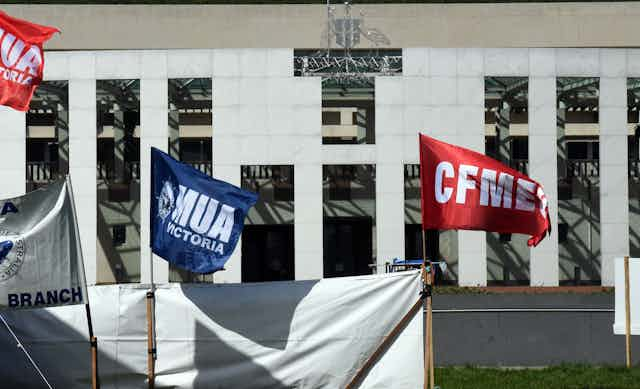Battle lines are being drawn over the proposed re-establishment of the building industry “watchdog” the Australian Building and Construction Commission (the ABCC). It is shaping up as a possible trigger for a double dissolution election.
Legislation introduced to the Senate to bring back the controversial body has already been rejected once. If it is rejected in the same form again, when parliament sits next month, it would provide a second trigger for both houses of parliament to be dissolved. The deadline for a double dissolution is May 11.
The return of the ABCC was the government’s immediate response to the recommendations of the Royal Commission into Trade Union Governance and Corruption (commonly referred to as ‘TURC’), headed by Dyson Heydon.
On Wednesday, addressing the National Press Club, Treasurer Scott Morrison claimed this would be ‘an important economic reform’ and the ABCC’s earlier abolition had been ‘a productivity killer and job destroyer’.
Recently, Workplace Relations Minister Michaelia Cash has linked the ABCC legislation to the TURC report.
Union governance
While there is an obvious political agenda to link TURC and the ABCC, the policy link is not so clear.
The key issues to be dealt with as a result of TURC are about proper union governance. Members have a right to believe that their fees are being used, ultimately, to advance members’ interests.
These days, people are free to join or not join unions – they are not an agency of the state. So it is not appropriate for government to be deciding who runs unions or how they are run. But potential members need to have enough information to make informed decisions about their money and actions.
Whatever the merits of the TURC findings - and there is much dispute about them - the ABCC legislation does not principally address the issue of union governance.
Productivity or militancy
The ABCC’s original rationale, still repeated, was to improve productivity. That rationale was subsequently discredited, when it was found the original claims ($3 billion in productivity gains and rising) were based on spreadsheet errors.
It was established in 2005 by the Howard government, and abolished in 2012 under Prime Minister minister Julia Gillard. As Minister she had appointed a new, less confrontational head in 2010. The replacement body (the Fair Work Building and Construction Commission) retained several of its powers, albeit with greater safeguards for workers.
The impact of the ABCC legislation was to raise penalties for many existing breaches of industrial law (such as taking certain industrial action or affecting the right to belong or not belong to a union) and to create criminal sanctions for workers who wouldn’t attend secret hearings or answer questions or who spoke about the hearings afterwards. Ordinary workers in the building industry had no more rights than suspected terrorists. The new draft legislation would be very similar.
This legislation is mainly about combating worker militancy in the construction industry, and has little to do with union governance.
Mission creep
The Royal Commission dealt with unions in a number of industries, not just construction.
However, the ABCC legislation only applies, in theory, to one industry (though it has ramifications through the supply chain). Yet if the ABCC legislation is passed as if it were related to the TURC report, then in a short time the question will be asked: “why are we not passing the same legislation in other industries mentioned by the TURC report?”
The logic would be hard to resist.
After that, the question will be asked, “why are unions in other industries not subject to the same obligations as these unions?”
In a few years, ABCC-style legislation could apply throughout the workforce, with all workers potentially subject to those coercive powers and penalties. It’s what military strategists call “mission creep”.
Yet employers breaching industrial laws would be no worse off. For example, underpaying staff is probably more costly for workers than malfeasance by union officials (there are more than $25 million in claims against just one entity). Misbehaving employers would probably be better off, in fact, because reduced union and worker power would make underpayment easier. Underpayments are so common among restaurateurs that when one is caught, the excuse they use is “everyone is doing it”. The breaches found there seem to be the tip of an enormous iceberg.
Employers who fail to pay workers’ superannuation entitlements are to be treated more leniently. Conflicts of interest in the financial advice industry would be made legal if government legislation were passed. Industry superannuation funds, which consistently generate higher returns to members than bank-owned retail funds, would see their boards swamped by so-called independent representatives from the low-performing sector if other rejected legislation succeeded.
So if there are broad problems of illegality, poor governance and corruption, we need to look beyond unions to other groups in society, including politicians, public servants and corporations.
A considered examination
Hence rather than rushing in to implement ABCC, we need a considered examination of each recommendation of TURC.
Considered, because some recommendations might deal legitimately with governance issues, while some (perhaps many) might just be an excuse for the executive to reduce workers’ power.
And if the ABCC became the benchmark, government would ultimately be able to harass trouble makers of any type, and jail workers who refuse to answer inquisitions about what happened in a meeting of restaurant staff, nurses, bank employees, or teachers’ aides.

